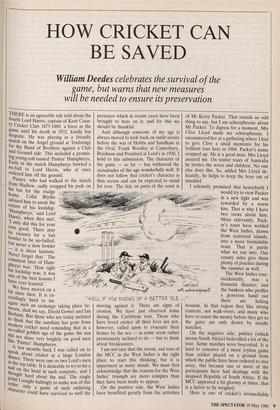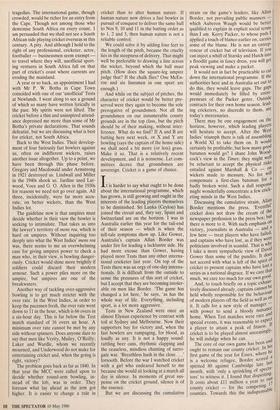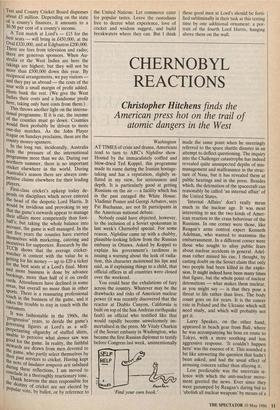HOW CRICKET CAN BE SAVED
William Deedes celebrates the survival of the
game, but warns that new measures will be needed to ensure its preservation
THERE is an agreeable tale told about the fourth Lord Harris, captain of Kent Coun- ty Cricket Club 1875-1889, a force in the game until his death in 1932, kindly but despotic. He was playing in a friendly match on the Angel ground at Tonbndge for the Band of Brothers against a Club and Ground side. This included a prom's- mg young colt named 'Punter' Humphreys. Early in the match Humphreys bowled a no-ball to Lord Harris, who at once ordered him off the ground. Punter, who had walked to the match from Hadlow, sadly strapped his pads on his bat for the trudge home. Colin Blythe _ advised him to await the return of his lordship. Humphreys,' said Lord Harris, when they met, I only did this for your own good. There may be excuses for a fast bowler to be no-balled, but never a slow bowler i - t is sheer laziness. _ _ Never forget that.' The Comment later of Hum- ph. reys was: 'How right his lordship was; it was one of the best lessons I have ever learned.' We have moved on a bit since then. It is ex- ceedingly hard to im- agine such an exchange taking place be- tween, shall we say, David Gower and Ian Botham. But those who are today inclined to think that the sunshine has gone from modern cricket need reminding that in a sb. -called golden age of the game the sun d..1d not shine very brightly on good men Like 'Punter' Humphreys. A few months back I was called on to Speak about cricket at a large London dinner. There were one or two Lord's men at the top table. It is desirable to try to hit a nail on the head in such company, and I thought hard about the nail. The single Point I sought haltingly to make was of this order: only a game of such enduring character could have survived so well the pressures which in recent years have been brought to bear on it; and for this we should be thankful.
And although someone of my age is always moved to look back on sunlit scenes before the war of Hobbs and Sandham at the Oval, Frank Woolley at Canterbury, Bradman and Ponsford at Lord's in 1930, I hold to this submission. The character of the game — so far — has withstood the vicissitudes of the age wonderfully well. It does not follow that cricket's character is thus secure and can be expected to stand for ever. The tide on parts of the coast is w ELL,IF YOU KNOWS OF A BETTER 'OLE moving against it. There are signs of erosion. We have just observed some during the Caribbean tour. Those who have loved cricket all their lives are not, however, called upon to evacuate their homes by the sea — as some seem rather prematurely inclined to do — but to think about breakwaters.
I am not sure that the recent, sad tour of the MCC in the West Indies is the right place to start this thinking; but it is uppermost in many minds. We must first acknowledge that the reasons for the West Indies' triumph are more complex than they have been made to appear. On the positive side, the West Indies have benefited greatly from the activities of Mr Kerry Packer. That sounds an odd thing to say, but I am schizophrenic about Mr Packer. To digress for a moment, Mrs Clive Lloyd made me schizophrenic. I encountered her at a gathering where I had to give Clive a small memento for his brilliant tour here in 1984. Packer's name cropped up. He is a good man, Mrs Lloyd assured me. On winter tours of Australia he invites the wives and children. No one else does this. So, added Mrs Lloyd de- licately, he helps to keep the boys out of mischief.
I solemnly promised that henceforth I would try to view Packer in a new light and was rewarded by a warm kiss. That is why I have two views about him. More relevantly, Pack- er's tours have welded the West Indies, drawn from scattered islands, into a more formidable team. That is partly what we ran into. Our county sides give them plenty of practice during the summer as well.
The West Indies tour, incidentally, was a financial disaster; and the bankers who proffer a generous hand out there are licking wounds. In that region they like strong contests, not walk-overs; and many who have to count the money before they get to the gates are only drawn by needle matches.
On the negative side, politics (which means South Africa) bedevilled a lot of the tour. Some matches were boycotted. It is hard to conceive of a more joyless game than cricket played on a ground from which the public have been ordered to stay away, this because one or more of the participants have had dealings with the despised Republic of South Africa. If the MCC appeared a bit gloomy at times, that is a factor to be weighed.
Here is one of cricket's irremediable tragedies. The international game, though crowded, would be richer for an entry from the Cape. Though not among those who demonise South Africa on every count, I am persuaded that we shall not see a South African side playing cricket overseas in this century. A pity. And although I hold to the right of any professional, cricketer, actor, footballer — businessmen seem exempt — to travel where they will, unofficial sport- ing ventures in South Africa fall on that part of cricket's coast where currents are eroding the mainland.
A year or so back, an appointment I had with Mr P. W. Botha in Cape Town coincided with one of our 'unofficial' Tests at Newlands. I went along to see a ground of which so many have written lyrically in the past. My spirits were not lifted. The cricket before a thin and uninspired attend- ance depressed me more than some of Mr Botha's private declarations. That sounds defeatist, but we are discussing what is best for cricket, not South Africa.
Back to the West Indies. Their develop- ment of four furiously fast bowlers against us, often on indifferent wickets, raises another issue altogether. Up to a point, we have been through this phase before. Gregory and Macdonald under Armstrong in 1921 destroyed us. Lindwall and Miller in the 1940S shook us. Jardine used Lar- wood, Voce and G. 0. Allen in the 1930s for reasons we need not go over again. All three, incidentally, were far more accu- rate, on better wickets, than the West Indies lot.
The guideline now is that umpires must decide whether in their view the bowler is seeking to intimidate. That takes us into the lawyer's territory of mens rea, which is hard on umpires. Without inquiring too deeply into what the West Indies' mens rea was, there seems to me an overwhelming case for giving umpires power to check a man who, in their view, is bowling danger- ously. Cricket would shine more brightly if soldiers could discard their modern armour. Such a power piles more on the umpire, but umpires are one of the breakwaters.
Another way of tackling over-aggressive bowling is to get much stricter with the over rate. In the West Indies, in order to keep the pacemen fresh, the over rate went down to 11 in the hour, which is 66 overs in a six-hour day. This is far below the Test match standard of 16 overs an hour. A minimum over rate cannot be met by any side without spinners. Does anyone dare to say that men like Verity, Mailey, O'Reilly; Laker and Wardle, whom we recently mourned, and Underwood do not make for entertaining cricket and, when the going is right, victory?
The problem goes back as far as 1840. In that year the MCC were called upon to decide whether round-arm bowling, in- stead of the lob, was in order. They foresaw what lay ahead as the arm got higher. It is easier to change a rule in cricket than to alter human nature. If human nature now drives a fast bowler in pursuit of conquest to deliver the same ball to Nos 9, 10 and 11 in the batting order as to 1, 2 and 3, then human nature is not a reliable control.
We could solve it by adding four feet to the length of the pitch, because the cruelty lies in the steepness of delivery. That might well be preferable to drawing a line across the wicket, beyond which the ball must pitch. (How does the square-leg umpire judge that? If the chalk flies? One McEn- roe and six linesmen in one sport are enough.) And while on the subject of pitches, the character of cricket would be better pre- served were they again to become the sole prerogative of groundsmen. Not all the groundsmen on our innumerable county grounds are in the top class, but the pitch should be of their making, without inter- ference. What do we find? If A and B are batting here next week, or X and Y are bowling (says the captain of the home side) we shall need a bit more (or less) grass. Make it so. That is a relatively recent development, and it is nonsense. Let com- mittees decree that groundsmen are sovereign. Cricket is a game of chance.
It is harder to say what ought to be done about the international programme, which has grown, is still growing and ought in the interests of the leading players themselves to be diminished. Sri Lanka (Ceylon) has joined the circuit and, they say, Spain and Switzerland are on the horizon. I was in Australia earlier this year for the tail-end of their season — which is when the tell-tale symptoms show up. Like Gower, Australia's captain Allan Border was under fire for leading a lacklustre side. He had more excuse than Gower, having played more Tests than any other interna- tional cricketer last year. On top of the Tests there was an orgy of one-day interna- tionals. It is difficult from the outside to sense the pressures of this sort of cricket, but I accept that they are becoming intoler- able on men like Border. 'The game has changed a lot here,' he says, 'as has the whole way of life. Everything, including sport, is a lot more aggressive.'
Tests in New Zealand were once an almost Elysian experience by contrast with toil at Sydney and Melbourne. Now their supporters bay for victory and, when the fast bowlers are rampaging, for blood, as loudly as any. It is not a happy sound: rattling beer cans, rhythmic clapping and the ceaseless, mindless chanting of surro- gate war. 'Breathless hush in the close. . .' forsooth. Before the war I watched cricket with a girl who endeared herself to me because she would sit looking at a match all day in silence. In moments of great sus- pense on the cricket ground, silence is of the essence.
But we are discussing the cumulative strain on the game's leaders, like Allan Border, not prevailing public manners — which Auberon Waugh would be better qualified to explain in explicit social terms than I am. Kerry Packer, to whose pads applied a touch of blanco earlier on, carries some of the blame. He is not an entrep- reneur of cricket but of television. If you can inject a whiff of Starsky and Hutch into a floodlit game in fancy dress, you will get peak viewing and make a packet. It would not in fact be practicable to cut down the international programme. If the authorities here and in Australia set out to do this, they would leave gaps. The gaps would immediately be filled by entre- preneurs of the Packer genre. Outside contracts for their own home season, lead- ing cricketers, no discredit to them, are today's mercenaries. There may be one engagement on the horizon, however, which leading players will hesitate to accept. After the West Indies' triumph there is talk of assembling a World XI to take them on. It would certainly be profitable; but how many good batsmen would go? I share John Wood- cock's view in the Times: they might well be reluctant to accept the physical risks entailed against Marshall & Co — 0.1 wickets made to measure. No fee wi" compensate a first-class batsman for a badly broken wrist. Such a dull response might wonderfully concentrate a few crick- eting minds in the West Indies. Discussing the cumulative strain, Allan Border mentions the press. 'Eventful' cricket does not draw the cream of the newspaper profession to the press box; but there is more to it. With such emphasis on victory, journalists in Australia — and a few here — treat players who have failed, and captains who have lost, as if they were politicians involved in scandal. That is whY I take a more sympathetic view of David Gower than some of the pundits. It does not accord with what is left of the spirit of cricket to present captains who have lost a series as a national disgrace. If we care tbat much, we care too much for our own good' And, to touch briefly on a topic exhaus- tively discussed already, captains cannot be held wholly responsible for the behaviour of modern players off the field as well as on it. It calls for a new style of manager -- with power to send a bloody nuisance home. When Test matches were rare an°. special events, it was reasonable to expee:, a player to attain a peak of fitness. o cricket is to be played almost unceasinglY, he will indulge when he can. The core of our own game has been an.d ought to remain our county cricket. In his first game of the year for Essex, where be is a welcome refugee, Border scored a spirited 80 against Cambridge late las' month, with 'only a sprinkling of specta- tors' to witness it. I found that dispiriting. It costs about £11 million a year to ran county cricket — for the competing 17_ counties. Towards this the indispensabw Test and County Cricket Board dispenses about £5 million. Depending on the state of a county's finances, it amounts to a 30-50 per cent of a county's income.
A Test match at Lord's — £15 for the best seats — will bring in £450,000, at the Oval £320,000, and at Edgbaston £200,000. There are fees from television and radio; there are generous sponsors. When Au- stralia or the West Indies are here the takings are highest; but they will not be more than £500,000 down this year. By reciprocal arrangements, we pay visitors — and they pay us abroad — the costs of the tour with a small margin of profit added. Hosts bank the rest. (We give the West Indies their costs and a handsome profit here, taking only bare costs from them.) This throws another light on the interna- tional programme. If it is cut, the income of the counties must go down. Counties would then probably be driven to more one-day matches. As the John Player league on Sundays proclaims, these are the county money-spinners. In the long run, incidentally, Australia feels the pressure of the international programme more than we do. During our northern summer, there is no important cricket elsewhere in the world. During Australia's season there are always com- petitive claims elsewhere for their leading players.
First-class cricket's upkeep today de- pends on disciplines which never entered the head of the despotic Lord Harris. It would be invidious and provoking to say that the game's stewards appear to manage their affairs more competently than foot- ball's; but taking the whole balance into account, the game is well managed. In the last five years the counties have exerted themselves with marketing, catering and incentives for supporters. Research by the TCCH shows that the average cricket- watcher is content with the value he is getting for his money — up to £20 a ticket for the best seats at a Lord's final. More and more business is done by advance bookings, more than half of it on credit cards. Attendances have declined in some areas, but overall no more than in other Sports. There is a reassuring professional touch in the business of the game, and it takes the trouble to stay in touch with the customers. It was fashionable in the 1960s, the 'progressive' years, to deride the game's governing figures at Lord's as a self- Perpetuating oligarchy of stuffed shirts, unable to perceive what demos saw was good for the game. In reality, the faithful tstewards are drawn from men devoted to the game, who partly select themselves by their past services to cricket. Having kept Me note of laudator temporis acti subdued 'luring these reflections, I am moved to Conclude in a thoroughly reactionary tone. Thank heavens the men responsible for the destiny of cricket are not elected by Popular vote, by ballot, or by reference to the United Nations. Let commerce cater for popular tastes. Leave the custodians free to decree what experience, love of cricket and wisdom suggest, and build breakwaters where they can. But I think these good men at Lord's should be forti- fied subliminally in their task at this testing time by one additional ornament: a por- trait of the fourth Lord Harris, hanging above them on the wall.




























































 Previous page
Previous page